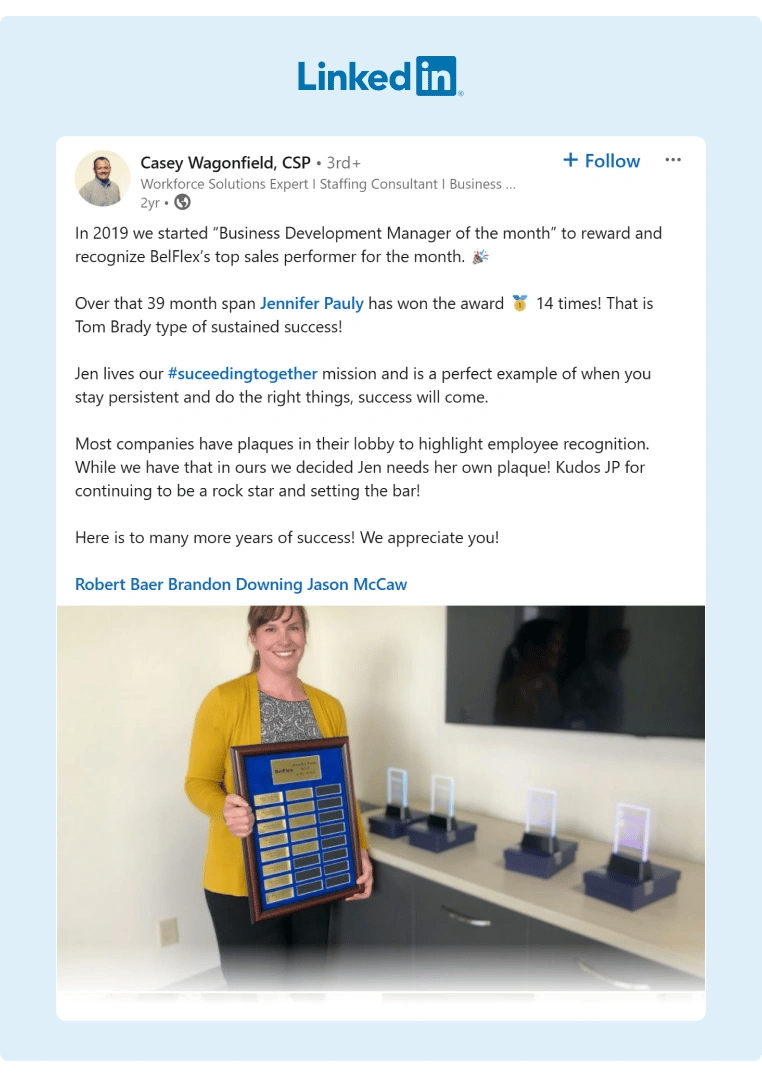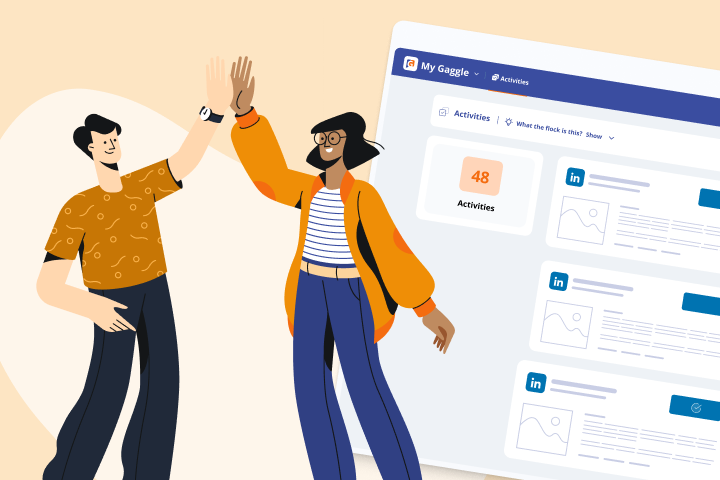10 Corporate Brand Identity Tips To Attract Top Talent
Did you know that corporations are considered “legal persons”? Under U.S. law, corporate personhood gives corporations many of the same rights as people. Corporations can own property, enter into contracts, sue and be sued, etc.
But, what if your business really was a person? What would they be like? What personality would they have? And, more importantly, would you want to work for them?
In this article, we’ll explore corporate branding. We’ll break down how it benefits your business, and how you can leverage it to attract the best talent in your industry.
What Is Corporate Branding?
Corporate branding is how you present your company to the world. From product branding to work-life environment to customer service, it's about letting your business’ personality shine. It’s showcasing your brand’s mission and values to potential candidates, current employees, and consumers.
Let’s play a game and imagine what two companies, Patagonia and Starbucks, would be like if they were real people.
Up first: Patagonia. Let’s say, they’re in their mid-20s and outdoorsy. They love hitting the trail before the tourists get to the park. They’re neat, professional, and always on-the-go. They probably own a campervan.

In contrast, Starbucks is in their 30s and not outdoorsy. They’re an aspiring writer who is kind and always goes out of their way to help.

Of course, these are just hypothetical personas. But, they help you imagine what these companies would be like if they were real people instead of big businesses. Giving them a personality makes them more human and relatable, which fosters a connection and builds trust.
In reality, we know that these companies have spent a lot of time carefully crafting their corporate identities and personalities to build brand awareness and trust with their target audiences. These companies know that having a strong corporate brand identity will pay off with several benefits.
Benefits of a Strong Corporate Brand Identity in Talent Acquisition
Building a strong corporate brand identity isn’t just a marketing exercise. It has real-world benefits for you and your business, as we’re about to explore.
Here are some benefits of having a strong corporate brand identity:
Attracts a High-Caliber Talent Pool
Having a positive brand identity, means you likely have happy employees working for you. These engaged employees can be transformed into your brand ambassadors. As they promote your company’s perks and benefits to their social networks, they’ll attract the attention of potential high-quality candidates.
A candidate who wants to learn about your culture, values, and reputation before applying will typically be a better fit than someone who applies “blindly” to a job posting.
Reduces Recruitment Costs and Time-To-Hire
When your corporate brand identity is attractive, you won’t just be somewhere people are happy to work for; you’ll be a company people want to work for. As a result, the top talent in your industry will be looking for job opportunities with you.
So, the next time that you hire, you won’t have to cast your net so wide to ensure you reach the best candidates; they’ll already be prepared and waiting. This reduces recruitment costs and results in a faster hiring process.
Establishes a Strong Employer Brand
Developing a corporate brand identity plays a role in establishing a strong employer brand. An employer branding strategy helps define a brand’s employee value proposition (EVP) to current employees and potential candidates. If your employees feel recognized (and rewarded) for their contributions and understand their role in your company’s mission and values, they’re far more likely to become brand advocates, which helps attract the best talent.

Encourages Employee Advocacy
A positive brand image is key to getting workers to participate in employee advocacy programs. Employees who are happy and engaged are far more likely to spread through word-of-mouth why your company is a great place to work.
Employee testimonials also carry a lot of weight with potential candidates. Employees are viewed as genuine and authentic. Who knows better than your employees what it is like working for you? That’s why word-of-mouth is such a powerful tool when attracting top talent.
10 Do’s and Don’ts for Building a Corporate Brand Identity To Attract Top Talent
Now, let’s take a look at 10 do’s and don’ts for building a solid corporate brand. These tips will help you attract the best talent for your business.
1. Do Define Your Employer Value Proposition (EVP)
Your employer value proposition (EVP) is a statement of the values, culture, rewards, recognition, and support that you offer your employees. It shows how you can help them grow and advance with your company.
Defining your EVP gives you a roadmap for building your corporate brand identity, which will attract top talent. It defines what you’ll offer talent and what you expect from employees in return.
Take Canva, for example. By defining its EVP, it built an interactive site that highlights what Canva stands for and what’s great about working for the company. This gives potential top talent insight into what Canva is like as both a brand and an employer. Ideally, a strong EVP will attract talent to apply and become a part of the team.

Source: Canva
2. Do Encourage Employees To Be Brand Ambassadors
You’ve worked hard to build a company with strong values and a positive culture. You reward and nurture your employees. In return, they work hard to offer a great product or service. They should be proud of that. So, give them permission to share what it’s like working for your company.
By encouraging your employees to share what’s great about working for your company, they can help strengthen your business’ corporate brand identity through word-of-mouth marketing. This, in turn, makes it easier for you to attract talent. Word-of-mouth testimony from true brand ambassadors like employees is one of the most genuine and persuasive ways of letting people know about your corporate brand.
Managers can also utilize tools like Paylocity HRIS software to financially incentivize existing employees, offering bonuses to those who bring new talent into the company. This will motivate employees to act as ambassadors and involve them in the recruitment process, helping to build unity across your growing workforce.
Chevron’s video below is a great example of empowering employees as brand ambassadors. The company asks its employees to discuss the benefits of diversity, highlighting their commitment to the cause.
Source: Chevron
3. Do Showcase Your Company Culture
Nowadays, employees (and consumers) crave authenticity. They see through fake marketing spiel and corporate speak. They want to know why they should work for your company, and a great way to “sell” your company to potential talent is to showcase your company culture.
There are a variety of ways to showcase your company culture. Implementing employer branding videos during your recruitment process can give potential candidates insight into your company’s values and desired culture.
Employee spotlights are another effective tool that can showcase your workplace culture. Here, applicants are taken through a day in the life of a team member who works in the role that the candidate is applying for. Also conveying core values and culture in job descriptions can help candidates decide if your culture is the right fit for them.

Source: MaVis Imaging GmbH
4. Do Build an Engaging Social Media Presence
Having a strong social media presence can build brand awareness, generate high-quality leads, and attract talent. On social platforms like LinkedIn, Facebook, and X, you can use employee advocacy to boost lead generation. By tapping into your employees’ social networks to share high-quality content and engage with others’ posts, you’ll be building an engaging social media presence.
For example, Sodexo has a dedicated Facebook page just for “Life at Sodexo USA.” Here, they share work-life, company news, job openings, and other relevant content.

Source: Sodexo
Social media is a great place to connect with top talent while showcasing your corporate brand identity. By generating leads using content that positively reflects your brand identify, you'll be widening the potential talent pool that you can draw from.
5. Do Embrace Diversity and Inclusion Initiatives
When creating a strong corporate brand identity, you want to craft an inclusive employee brand for diverse teams. By attracting candidates from a variety of different backgrounds, you’ll be creating a diverse and inclusive team who can respond to the challenges and needs of your target audience.
Our previous example, Sodexo, also does an excellent job of embracing diversity and inclusion initiatives. It strives for the most diverse workforce possible, and it is one of the few businesses with more women on their board of directors than men, with women making up 60% of the board.
Sodexo’s commitment to diversity is not only commendable, but it also attracts talent from a diverse candidate pool.

Source: Sodexo
6. Don't Neglect Messaging Consistency Across Channels
Your corporate brand identity needs to be consistent both internally and externally. However, it can be challenging to communicate consistently, especially when relying on different workers or departments to handle that message across multiple channels.
By ensuring that your employees are aware of your corporate brand image and utilizing tools such as employee advocacy platforms like GaggleAMP, customer relationship management systems (CRMs), and call script software to keep your message on brand, you can present a unified message and stop your teams from becoming siloed.
7. Don’t Underestimate the Power of Storytelling
Employee storytelling campaigns humanize your brand and give a peek into your company’s work environment. Don’t be afraid to tell your brand’s story. What was the inspiration for your brand? What fuels your passion? People will relate to your story better than you may think.
If you want proof, just look at Ben & Jerry’s. Their corporate identity (and humor) runs through everything they do, from product branding to how they treat their suppliers and employees. In this example, their marketing team showcases its humor with a fun Instagram reel.

Source: Ben & Jerry’s
8. Don't Over-Promise or Make Exaggerated Claims
Just as people crave authenticity, they can also spot fake claims a mile away. Sometimes it’s tempting to over-promise or make exaggerated claims, especially when managers want to ensure they get their favorite candidate.
However, if you promise the world and don’t deliver, candidates (and employees) will notice, and your brand’s reputation will suffer. Remember, word-of-mouth is a powerful tool that can have both a positive and negative impact.
The key here is to be transparent and honest in your messaging. Consider following an approved script for emails and offer letters, or using voicemail drop outreach software when calling to ensure candidates only get accurate information. Similarly, contract management software should be used to ensure uniformity of contract terms for employees.
9. Don't Overlook Employee Reviews and Feedback
Encouraging employee feedback can give you a more accurate picture of what’s working and what needs to be improved. Offer employee engagement surveys like pulse survey questions, one-on-one meetings, and exit and stay interviews to gather information. These tools can help you find out how you can improve working conditions, work-life balance, job satisfaction, team cohesion, etc.
Australian tech giant Atlassian knows the importance of employee feedback. Atlassian encourages its staff to be open and give regular feedback. According to CEO Scott Farquhar, “When information flows freely, it provides everyone in the organization with the right context to unlock their creative ideas.”

Source: Atlassian
This openness greatly improves worker satisfaction, which builds your EVP, improves worker retention, and makes you more attractive to top talent.
10. Don't Prioritize Recruitment Over Employee Retention
While you’re courting potential talent, it’s essential to not forget about the talent that you have already attracted and hired.
The hiring process is time-consuming. You have to onboard and train new employees, which takes time, effort, and money. You’ve invested a lot in your employees. Don’t throw it all away because you lose focus on what matters—the current employees who are the backbone of your company.
In fact, sometimes the talent you seek is already working for you. You might already have the perfect person for the job, you just need to provide them support and allow them to grow with you.
Ready To Attract Top Talent?
A strong corporate brand identity lets your company's personality shine. It showcases why your product or service is great, and why employees want to work for you.
When it comes to attracting talent, your employees are your best resource with their robust social networks and ability to be viewed as authentic thought leaders. By implementing an employee advocacy program and using an employee advocacy tool like GaggleAMP, you can transform your employees into brand ambassadors and amplify your social engagement and branch reach.
GaggleAMP’s AI-powered paraphrasing technology can also be used to create pre-written content for employees, which maintains consistency in brand messaging and streamlines the employee advocacy process.
Ready to supercharge your corporate brand identity and attract top talent? Schedule your demo today.











